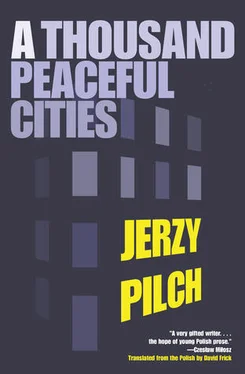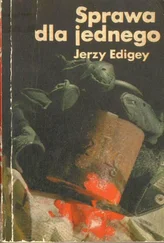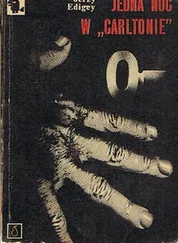“Not directly,” Mr. Trąba became impatient, “not directly, but it’s in the subtext, or rather in innumerable subtexts. Just recall carefully, Commandant, Paul’s Epistles to the Romans, Ephesians, not to mention Hebrews. And the prophet Isaiah, chapter eleven, verse twelve, and your namesake, the prophet Jeremiah, touches upon this topic in the sixteenth, and in the twenty-forth, and in the thirty-first chapter. Ezechiel!” shouted Mr. Trąba. “Ezechiel! Above all the prophet Ezechiel and the famous prophecy about the field of bones slowly taking on life!”
“I’ll investigate,” said Commandant Jeremiah in an unexpectedly police tone. “I’ll investigate.”
“I assure you that you can believe a person established in his faith and trained in Scripture. Yes,” Mr. Trąba suddenly fell into a dreamy mood, “that would be a worthy act, that would be an act worthy of my dying ambitions — the deed of conversion. But unfortunately there is little time, and this is the work of decades at least, and not within the abilities of one lonely Lutheran who’s caught in the clutches of addiction. Yes,” he repeated in a voice marked by strategic deliberation, “let them come to full bloom, even to the first signs of wilting. Let them people the streets and markets. Let us hear the murmur of conversations and the rustle of gabardines. Let synagogues be erected. Let the Sabbaths, Pesach, the Feast of Tabernacles, and Purim be celebrated.”
“ Á propos ,” Commandant Jeremiah interrupted Mr. Trąba’s visionary trance, “ á propos Purim, did you, comrade, recently visit Mrs. Rychter and offer her and her numerous relatives help in preparation for the celebration of Purim?”
“I won’t deny it. I tried in my small way to do what I could in order to aid in the realization of God’s plans, but they didn’t avail themselves of my offer.”
“There’s nothing strange there. An old German family has absolutely no reason to celebrate Purim. And, by the way, I don’t wish to trivialize your motives,” said the Commandant, “I don’t wish to trivialize, but I must note that, in the course of celebrating Purim, excessive consumption of alcohol is practically a religious obligation.”
“You don’t wish to trivialize, but you do trivialize!” shouted Mr. Trąba. “You do trivialize!”
“It’s you, Comrade Trąba, who trivializes. You trivialize both the Scripture and God’s designs.”
“But what’s at stake here, what’s at stake if not salvation? After all, as the eventual assassin of First Secretary Władysław Gomułka, I have no choice but to concern myself with the question of salvation. Of course, I would prefer not to murder him, and, instead of troubling myself with the question of my own salvation, help someone else to salvation. For example, the Jewish people. They who have been dispersed will be gathered in. They will regain their identity. They will be strengthened in their identity, and they will develop diversely in their Judaism. They will be converted. They will convert to Catholicism. And then, without fail, having become disgusted by Rome, they will convert to our Lutheran faith. What’s at stake? What more is at stake here? And I would undertake this deed as my dying act. I would truly do this for humanity. Truly. But, I repeat, it’s a question of time. And I don’t have time. I need something quick, something quick like the flash of a knife, like the flight of an arrow.”
“You know what, Comrade Trąba,” Commandant Jeremiah said with a phlegmatic, well-fed voice, “you know what? If you really do intend to convert the Jews to the Lutheran faith, of the two evils it would be better that you whack somebody, comrades.”
The Commandant raised his glass.
“Drink up, comrades.”
And when the men had inclined their heads, and then raised them up again, the Commandant said with dignity:
“For at least the last hour I have been off duty, but in spite of everything I want you, comrades, to be forewarned. I made a request of Comrade Station Master Ujejski. I made a request that he let me know if you comrades should suddenly wish to buy tickets. For instance, for the night train to Warsaw. I want you to know about this, comrades.”
The parchment map of the sky slowly took on life. Streams of deep blue air flowed across it. Golden sand poured from the planets. Within the large constellations you could hear music. I awoke in the middle of the night, and in the dark, gropingly, I recorded the word “occupation” in my notebook — in a moment someone would whisper it in the depths of the sleeping house.
In those days I was never parted from my pencil and notebook. The desire, stronger than anything else, to record words and sentences that had just been uttered, or would be in a moment, directed my every step, waking and sleeping. I would place the notebook and pencil on the nightstand, and when the golden-black grandfather clock in the entryway rang out the most terrible of hours, 2:00 or 3:00 in the morning, when the Antichrist himself touched my featherbed with a wet wing, when during every season of the year an infernal silence reigned, I would reach for notebook and pencil and record the word or sentence that brought relief. “Occupation,” I wrote, but I didn’t feel relief or consolation. Noises unusual for that hour were coming from the kitchen. Someone was moving a chair. Someone knocked delicately, probably at the window, since the panes rattled. Someone said something. Somebody answered. I lit the lamp, and Mr. Trąba’s voice became more distinct, as if intensified by the light. To this day I am absolutely certain that, throughout my entire childhood, I was awakened from sleep either by Mr. Trąba’s voice or by the sound of the Wittenberg bells in the church tower.
A few minutes before 6:00 in the morning, Sexton Messerschmidt would climb the wooden steps, and in the gray dawn of the fall, in the winter darkness, or with the summer radiance piercing the shutters, the cast-iron caps would begin to move more and more forcefully. In the morning, the sound of the bells was delicate like the slowly rising eyelid of a Lutheran confirmation-class girl. At noon, it possessed the fullness of a fire roaring under Evangelical stovetops. And at twilight, it was mannerly and pliable like the mixed forests on Buffalo Mountain.
•
Sexton Messerschmidt knew how to pull the ropes such that he could achieve all those effects at will — the effect of the eyelid, the fire, and the mixed forest.
“You’ve got to have it here,” he pointed to his palms. “You’ve got to have the divine spark here. The divine azure spark,” he added with an enigmatic smile. “Without the divine spark, azure like a gas flame, no bell will ring.”
We would leave our packs in the sacristy. The church smelled of the Sunday clothes of Protestants. Sexton Messerschmidt carefully examined our hands.
“Not a single divine spark, not a trace of ability, to say nothing of talent,” he would say with disapproval. “Oh well. Cripples have the right to praise the Lord too. Come unto me. Only the pious, only the most pious, will attain the grace of entry to the tower today. You, Chmiel, you, Sikora, you, Błaszczyk. Today it shall be given unto you. You won’t even have to put your hands over your ears, since, anyway. . you are all deaf as posts.”
We followed him up the wooden stairs. Then with all our might we squeezed ropes that were fatter than our arms. The sweltering noon slowly began to smolder.
“Let the littlest bell sing,” cried Sexton Messerschmidt at the top of his voice, and he looked ironically upon our pathetic efforts. With seeming nonchalance he grasped the rope we had been straining at so ineffectually. “You gentlemen lack not only artistic talent but also physical strength. You are an absolutely worthless generation. When you grow up you will bring not only the Lutheran Church but also People’s Poland to ruin — which, after all, who knows, may be for the better.
Читать дальше












